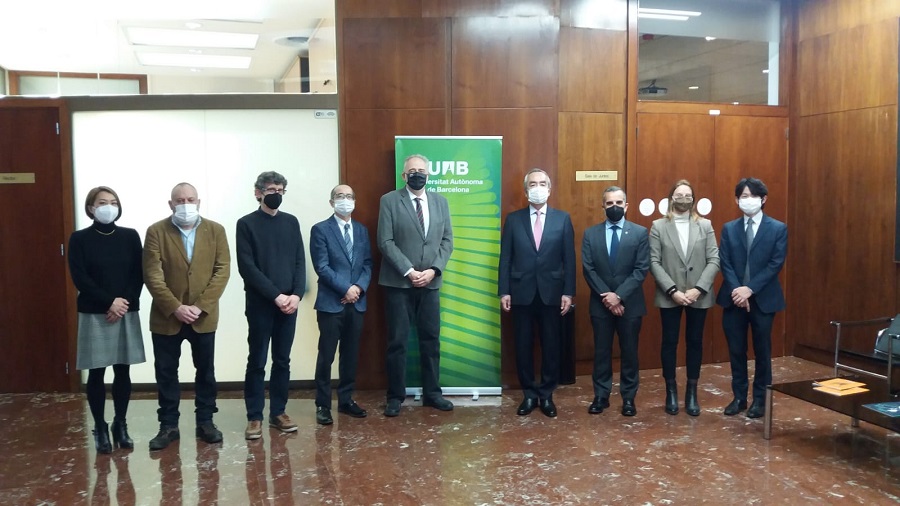First university in Spain to open a Sakura Network office for Japanese studies
The UAB signed an agreement today with the Japan Foundation to create a UAB office for Japanese studies, the JF Sakura Network office, which will work towards improving the teaching and study of Japanese language and culture. The UAB thus becomes the first university in Spain to have an office dedicated to Japanese studies on campus, as well as the only one to house the official cultural institutions of China, South Korea and Japan. To celebrate the agreement, Rector Javier Lafuente and Faculty Dean Albert Branchadell met today with Kenji Hiramatsu, Japanese Ambassador to Spain.

The Sakura Network forms part of the Japan Foundation, a governmental institute in charge of promoting the language and culture of Japan throughout the world. The network focuses on the constant improvements to be made in the teaching of Japanese studies. Its new office, to be located in Research Module A of the UAB Parc de Recerca, will provide Japanese lecturers with the opportunity to have direct contact with the Japan Foundation, become involved in the measures taken to improve the teaching of Japanese language and culture, and organise cultural and informative activities.
The UAB is home to the largest community of Japanese university students in Spain, and was the first to offer official Japanese language exams. It has several exchange agreements with univerisities in Japan and each year some thirty Japanese students travel to study at the UAB, and approximately the same amount of UAB students travel to Japan each year as well. It is the only university in Catalonia to offer both undergraduate and graduate programmes in East Asian studies.
Thanks to this agreement, the UAB esatblishes itself as a leading higher education institution with strong ties not only to Japan, but also to Eastern Asia, since it now has direct collaborations with the official cultural institutions of the three countries included in these studies: the same Research Module A also houses the Barcelona Confucius Institute and the King Sejong Institute, from China and South Korea, and all three are similar to the Cervantes Institute of Spain or the Ramon Llull Institute of Catalonia.
Ambassador Hiramatsu praised the “great work” done by the UAB, and qualified it as “one of the most prestigious universities in Spain” in the area of East Asian studies and, particularly, in relation to academic programmes in the language and culture of Japan. He expressed his desire for the new office to be “an important pillar” in promoting Japanese studies and to represent “an opportunity” for UAB students to get to know his country better.
UAB Rector Lafuente spoke on the relations between the UAB and higher education and research institutions in Japan and emphasised a “great interest” in strengthening these relations even further. He also pointed out both the relevant role played by the Faculty of Translation and Interpreting in this area, and the cross-curricular and multidisciplinary character of the University, which makes it easy to broaden relations with Japan to all fields of knowledge.
Also participating in the meeting were Yasushi Sato, Consul-General of Japan in Barcelona, and Azusa Takahashi, Second Secretary of the Japanese Embassy. On behalf of the UAB, in addition to the rector and faculty dean, the meeting included Màrius Martínez, Vice Rector for International Relations; Blai Guarné, coordinator of the East Asian academic programmes at the Faculty of Translation and Interpreting; Makiko Fukuda, coordinator of Japanese studies and head of the academic mobility programmes with Japan; and Kei Matsushima, lecturer in Japanese studies at the Faculty of Translation and Interpreting.
The UAB, with Sustainable Development Goals
Quality education